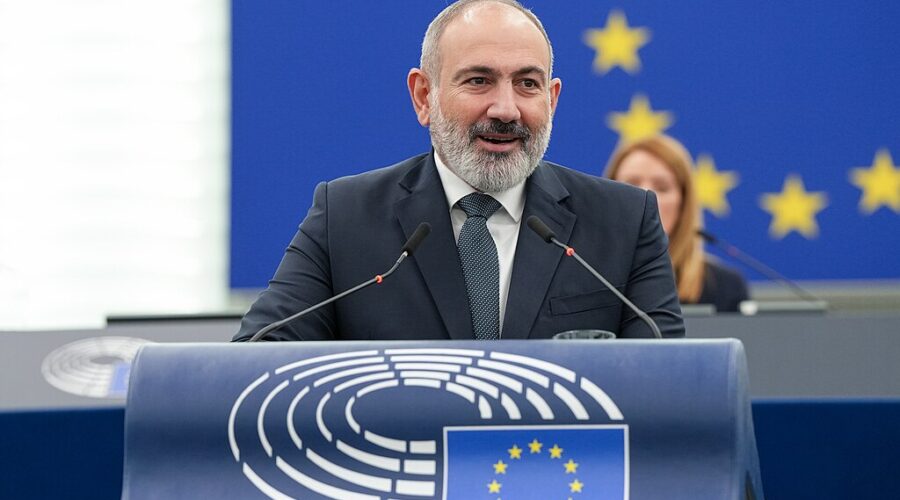“If you want peace, prepare for war”, says the ancient adage. Although Armenia and Azerbaijan are expected to normalize relations, and possibly even sign a peace deal by the end of the year, the two South Caucasus countries continue strengthening their military capabilities.
Over the years, Azerbaijan has been purchasing weapons from its ally Turkey, as well as from Israel. Even though Armenia is Russia’s nominal ally in the Collective Security Treaty Organization (CSTO), in 2009-2011 Moscow sold $5 billion worth of tanks, artillery systems and anti-tank missile systems to Baku. Rumors are flying that the energy-rich Caspian nation now plans to buy 48 self-propelled Nora-B52 howitzers from Serbia – a country that actively armed both Azerbaijan and Armenia prior to the Second Karabakh War in 2020.
Yerevan, for its part, recently started buying weapons from India, as well as from NATO member France. More importantly, the landlocked former Soviet republic, despite being a CSTO member, seeks to develop close military cooperation with the United States and Great Britain.
On the other hand, both Armenia and Azerbaijan are showing signs that they might be ready to bury the hatchet and open a new chapter in their relations. On December 7, the two archenemies made a surprising move by issuing a joint statement, claiming that they agreed to seize “a historical chance to achieve a long-awaited peace in the region”, hoping to sign a peace treaty before the end of the year.
They have also made a “goodwill gesture”, and exchanged war prisoners. Azerbaijan released 32 detained Armenian military servicemen for two Azerbaijani soldiers. Still, according to the California-based Center for Truth and Justice, during the 44-day war in 2020, as well as the Azerbaijani September 2023 offensive in Nagorno-Karabakh, some 200 Armenian civilians and military personnel were captured, which means that the POW issue between the two countries is yet to be fully resolved.
But in spite of that, all major global and regional actors – Russia, the European Union, Turkey, Iran, and the United States – welcomed the progress Baku and Yerevan have made towards peace. Since Azerbaijan reportedly refuses to negotiate with Armenia on Western platforms, and neither side seems to see Russia as a potential guarantor of peace, it is entirely possible that a peace deal will be signed in neighboring Georgia, or somewhere at the border between the two countries.
Such a move would undoubtedly allow both nations to freely claim that the normalization of their relations did not come as a result of foreign powers’ pressure. In reality, however, Russia and the West, as well as other actors, will continue to struggle for influence in the strategically important region.
But what would a peace treaty mean for Armenia and Azerbaijan?
According to most recent polls, 78 percent of Azerbaijanis support a peace deal with Armenia, while in June 2022, 89 percent of Armenians opposed any deal with Baku that would mean the end of the self-proclaimed Republic of Artsakh. It remains unclear if a new geopolitical reality – where Azerbaijan restored its sovereignty over Artsakh (which is the Armenian name for Nagorno-Karabakh) – had an impact on the Armenian population’s attitude regarding a peace deal with Baku, although the authorities in Yerevan seem determined to normalize relations with Azerbaijan at any cost.
“We simply wasted 30 years and spent our time and resources on a problem that was intractable from the beginning”, said Armenia’s Prime Minister Nikol Pashinyan, talking about Nagorno-Karabakh – a region internationally recognized as part of Azerbaijan, that was under Armenian control for almost three decades.
Now that the Karabakh issue is resolved in Azerbaijani favor, Pashinyan seems to have more room to make deals with Baku. But the problem for Armenia, as a defeated party, is that it will almost certainly have to make more concessions to Azerbaijan.
The energy-rich nation will undoubtedly pressure Yerevan to make “goodwill gestures” regarding a border delimitation, which means that up to 200 square kilometers of Armenian territory could belong to Azerbaijan. Moreover, Baku is unlikely to easily give up on its aspirations to have a direct land link between mainland Azerbaijan and its exclave of Nakhchivan through southern Armenian province of Syunik, bordering Iran.
Quite aware of that, Armenia’s decision to purchase weapons from France and India could be interpreted not only as Yerevan’s attempt to distance itself from Russia, but also as preparation for a potential conflict with Azerbaijan over Syunik. Alternatively, the authorities in Armenia could use the arms import as a camouflage, aiming to create an illusion at home that they are not willing to give up on their border with Iran, while in reality they might allow Azerbaijan to have a corridor to Nakhchivan, and further to Turkey.
One thing is for sure: Baku and Yerevan really have a “historical chance to achieve a long-awaited peace in the region”, although it is highly uncertain how long that peace will last.
Image: European Parliament

